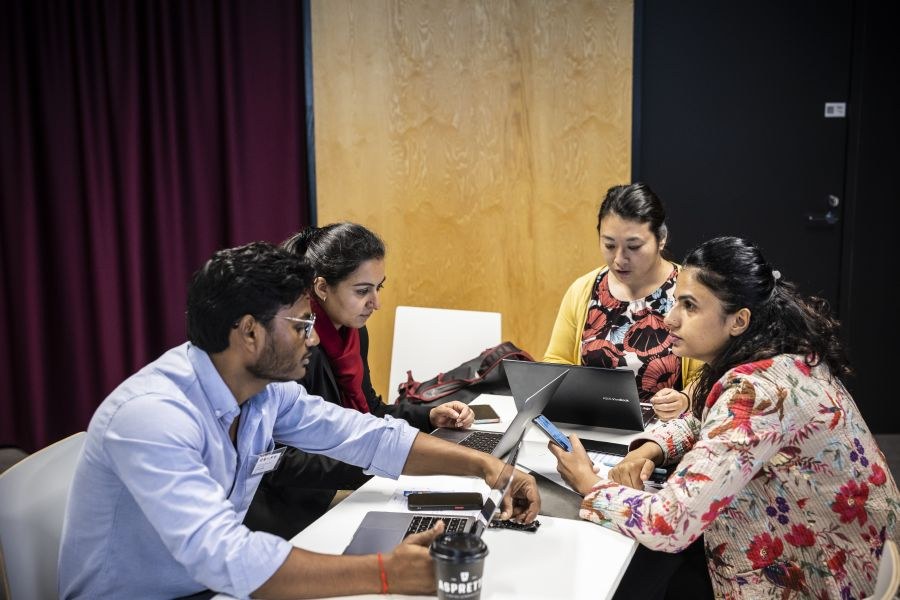Globelics Academy gathered young innovation researchers from around the world to Tampere

“In the early 1990s, a few pioneers in innovation research began to argue that this field is yet another thing that mostly stems from the Global North. They concluded that the knowledge of innovation systems and development given by academic research and education should also be strengthened in the South. This led to the creation of the Globelics network that supports the development of research communities in the Global South. Shortly afterwards, the Globelics Academy was created to help young doctoral researchers forward.”
These are the origins of the Globelics Academy, as explained by Senior Research Fellow Mika Kautonen who has organised the International PhD School at Tampere University from the outset. First held in Tampere in 2008, the Academy is arranged in the spirit of global solidarity.
“We do not actually get any money from Globelics to organise the event, but some of its key researchers come to lecture here without pay. We also raise funds to organise the Academy, and to pay for the travel and accommodation of doctoral students who would be otherwise unable to attend,” Kautonen says.
The Academy programme consists of group work and discussions, participants’ presentations of their own research, and lectures on the latest advances in innovation systems and development. In addition, the PhD students receive feedback on their work from guest lecturers who represent the cutting edge of innovation research. One example of this year's expert visitors was Erika Kraemer-Mbula, professor from the University of Johannesburg who also chairs the Globelics network.
Globelics Academy provides valuable perspectives and networks
Each year, approximately 25 participants are admitted to the Globelics Academy. Birendra Singh, one of this year's participants, says he was inspired to apply because of the friendly, interactive atmosphere that is encouraging to young researchers. Singh, who hails from India, was also interested in Finland as a host country and the fact that attending would be an opportunity to meet diverse people and gain access to diverse knowledge.
Unique learning and networking opportunities are in fact some of the key advantages of the Academy.
“The Globelics Academy gives you an opportunity to present our own research and get feedback from other doctoral students, professors, and researchers in the field. It is a great possibility to learn how to improve your work. Also, the International PhD School allows you to build relationships with other doctoral students. I now have 26 new researchers in my network whom I can approach for help, and we could even publish articles together,” says another participant, Naledi Gallant from South Africa.

Innovation research supports the development of Global South
According to Mika Kautonen, it is important to strengthen knowledge on innovation systems and development in low-income countries to prevent the gap between the Global South and North from widening. Economy is increasingly built on knowledge work, and innovation plays a key role in it. Research and academic expertise influence innovation policy at the level of countries, cities and companies, and academic education bring people to low-income countries who understand how to create an environment that is favourable for innovation.
Alongside competitiveness, innovation research also supports the building of more sustainable societies.
“Sustainable transitions require a range of innovations, but deploying them is not just about having a device that solves all the problems. You need to create infrastructure, education, and other things around it, so that social regulation, people’s mindsets, practices, and policies also support the transition to a more sustainable world,” Kautonen says.
It is precisely societal challenges that the Globelics Academy participants seek to address through their research.
“We do not really have any presentations or student papers that deal with issues that are typical for the Global North, such as how to develop an app to get pizza to your doorstep more conveniently. Instead, the PhD students are researching such issues as how to use the internet in education in low-income countries, or how to prevent sexual violence,” Kautonen adds.
The participants say that the Globelics Academy has given them a lot.
“If I were to sum it all up, I would say that the Globelics Academy has given me motivation and inspiration. I am more motivated to invest in my research and it has been really inspiring to listen to my peers and see how important it is to learn from each other,” Birendra Singh summarises.
Additional information:
Senior Research Fellow Mika Kautonen
+358 50 318 6116
mika.kautonen [at] tuni.fi
Photos: Jonne Renvall





